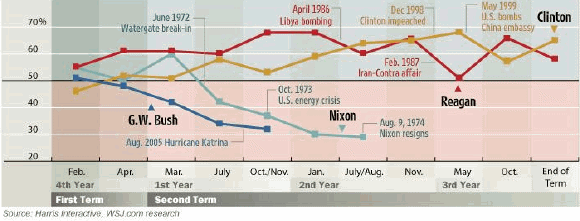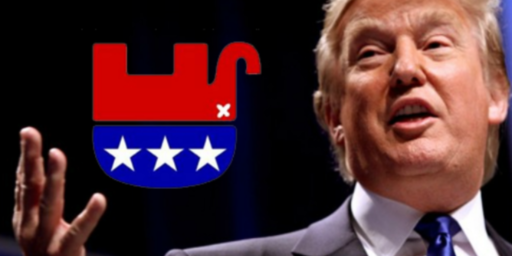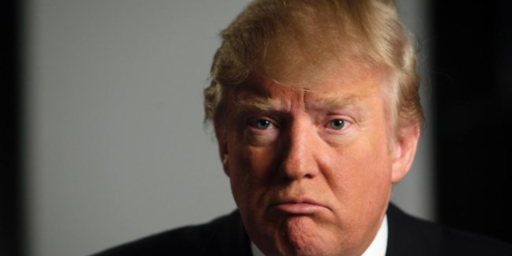Bush’s Popularity Reaches New Low
A new Washington Post-ABC News poll tracks with other recent surveys showing President Bush at the lowest public approval of his presidency. The internals are especially troubling, showing that a majority has doubts about his integrity.
Bush’s Popularity Reaches New Low (WaPo, A1)
For the first time in his presidency a majority of Americans question the integrity of President Bush, and growing doubts about his leadership have left him with record negative ratings on the economy, Iraq and even the war on terrorism, a new Washington Post-ABC News poll shows.
On almost every key measure of presidential character and performance, the survey found that Bush has never been less popular with the American people. Currently 39 percent approve of the job he is doing as president, while 60 percent disapprove of his performance in office — the highest level of disapproval ever recorded for Bush in Post-ABC polls.
Virtually the only possible bright spot for Bush in the survey was generally favorable, if not quite enthusiastic, early reaction to his latest Supreme Court nominee, Samuel A. Alito Jr. Half of Americans say Alito should be confirmed by the Senate, and less than a third view him as too conservative, the poll found.
Overall, the survey underscores how several pillars of Bush’s presidency have begun to crumble under the combined weight of events and White House mistakes. Bush’s approval ratings have been in decline for months, but on issues of personal trust, honesty and values, Bush has suffered some of his most notable declines. Moreover, Bush has always retained majority support on his handling of the U.S. campaign against terrorism — until now, when 51 percent have registered disapproval.
[…]
The dissatisfaction with Bush flows in part out of broad concerns about the overall direction of the country. Nearly 7 in 10 — 68 percent — believe the country is seriously off course, while only 30 percent are optimistic, the lowest level in more than nine years. Only 3 in 10 express high levels of confidence in Bush, while half say they have little or no confidence in this administration. Just 35 percent of those surveyed rated the economy as either excellent or good, with 65 percent describing it as not so good or poor. Although the government reported last week that gross domestic product rose 3.8 percent in the last quarter, despite the effects of Hurricane Katrina, 29 percent of those surveyed said they regard the economy as poor, the highest recorded during Bush’s presidency.
Attitudes toward Bush are sharply polarized by party, as they have been throughout his presidency. Almost 8 in 10 — 78 percent — of Republicans support the president, while just 11 percent of Democrats rate him positively. Republicans long have been the key to Bush’s overall strength, but Bush has suffered some defections since the beginning of the year, when 91 percent approved of the way he was handling his job.
Among independents, Bush’s approval has plummeted since the beginning of the year. In the latest poll, 33 percent of independents approved of his performance, while 66 percent disapproved. In January, independents were evenly divided, with 49 percent approving and an equal percentage disapproving.
The intensity of Bush’s support has changed since his reelection a year ago, with opponents deepening their hostility toward the administration. In the latest survey, 47 percent said they strongly disapprove of the way he was performing in office, compared with 35 percent who expressed strong disapproval in January. At the same time, the percentage who say they strongly approve of his performance has fallen from 33 percent last January to 20 percent today.
Yesterday, I noted that these numbers near Nixonian depths. Here’s an interesting graphic (via CarpetBagger report via Kevin Drum via Bill Ardolino) illustrating that point:

While presidents Reagan and Clinton both recovered from similarly low numbers to reclaim high levels of popularity, Bush faces serious obstacles. Most notably, the Iraq War is quite unpopular and likely to be with us for some time to come.
The Alito pick was a good step in the direction of regaining public confidence. A shakeup of his cabinet, including firing Karl Rove, could also help. There’s no sign, though, that this is on the agenda.






Just in case you missed all the MSM stories about the terrible job Bush is doing…
Just in case you missed the repeated “polls” showing that nobody likes him…
Here’s another to confirm once and for all that Bush is a heel…
So- now what? Where are all of the bright young solcialists with their great ideas?
No, Rove should not go.
Rove’s been doing a good job. Why give the left what they want for pity’s sake?
No more retreats!!!
Unfortunately, all the “bright young socialists” are to busy try to bail out the sinking ship.
Why is this “especially troubling”?
What this data doesn’t show is that both Reagan and Clinton had their lowest levels of public approval in their first terms. According to Gallup, Reagan bottomed out at 35% approval in January 1983, while Clinton’s lowest point was 37% in June of 1993.
Once they’d both won reelection, they never sank that low again, although Reagan dipped into the 40s again during Iran-Contra.
I think its noteworthy that Bush’s worst public approval ratings have come well into his second term. It would appear that the more the American public learns about Bush, the less they like him!
One wonders what his trajectory would have been if not for the artificial rallies of 9/11 and the invasion of Iraq!
Don,
I’d argue that the vast majority of Bush’s problems in the polls are a result of the Iraq invasion.
Is this the poll that was 35% Dem and 25% Rep respondants? Or was that a different one?
Gary:
Here are the WaPo poll internals: 31% Dem., 27% Rep., 38% other, with 52% leaning Dem., 41% leaning Rep., and 6% leaning independent. The age distribution is also skewed: 18-29, 22%, 30-39, 20%, 40-49, 20%, 50-64, 22%, and 65+, 16%. In other words, they cooked the poll to get bad numbers for Bush. Since this practice seems widespread, the graph comparing Bush’s numbers to previous Presidents is likewise suspect.
James:
While I agree with you on the Iraq situitation, I think that the high cost of gasoline, home heating oil and Gas is the main culprit. Bush had a very large amount of support from the average American, he is losing that support. Bush had best do something, (anything) to get energy coats under control and then and only then will he regain the average Americans support. Iraq does not directly effect everyone, but energy costs do.
If its true that there were more Democratic than Republican respondents to the poll, that doesn’t necessarily render it invalid. For decades, polls have shown that there are more self-identifying Democrats in the population than self-identifying Republicans.
The war in Iraq is the main irratent rubbing Americans the wrong way, but there is also the accumulative effect of mean spirited republican-driven legislative efforts: trying to privatize social security, severly limiting the ability of people to seek financial relief through bankruptcy, gutting of funds for improvement of infastructure, slashing of benefits for our military and their families, and in my opinion, the most serious offense- allowing corporations to sell our country out to foreign interests, specifically to China.